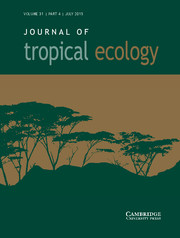Crossref Citations
This article has been cited by the following publications. This list is generated based on data provided by
Crossref.
Angulo‐Sandoval, Pilar
and
Aide, T. Mitchell
2000.
Leaf Phenology and Leaf Damage of Saplings in the Luquillo Experimental Forest, Puerto Rico1.
Biotropica,
Vol. 32,
Issue. 3,
p.
415.
Barone, John A.
2000.
Comparison of Herbivores and Herbivory in the Canopy and Understory for Two Tropical Tree Species1.
BIOTROPICA,
Vol. 32,
Issue. 2,
p.
307.
Angulo-Sandoval, Pilar
and
Aide, T. Mitchell
2000.
Leaf Phenology and Leaf Damage of Saplings in the Luquillo Experimental Forest, Puerto Rico1.
BIOTROPICA,
Vol. 32,
Issue. 3,
p.
415.
Barone, John A.
2000.
Comparison of Herbivores and Herbivory in the Canopy and Understory for Two Tropical Tree Species1.
Biotropica,
Vol. 32,
Issue. 2,
p.
307.
Wirth, Rainer
Weber, Bettina
and
Ryel, Ronald J
2001.
Spatial and temporal variability of canopy structure in a tropical moist forest.
Acta Oecologica,
Vol. 22,
Issue. 5-6,
p.
235.
Tessier, Jack T.
2004.
Leaf longevity of Oxalis acetosella (Oxalidaceae) in the Catskill Mountains, New York, USA .
American Journal of Botany,
Vol. 91,
Issue. 9,
p.
1371.
Angulo‐Sandoval, Pllar
Fernández‐Marín, H.
Zimmerman, J. K.
and
Alde, T. M.
2004.
Changes in Patterns of Understory Leaf Phenology and Herbivory following Hurricane Damage.
Biotropica,
Vol. 36,
Issue. 1,
p.
60.
Angulo-Sandoval, Pilar
Fernández-Marín, H.
Zimmerman, J. K.
and
Aide, T. M.
2004.
Changes in Patterns of Understory Leaf Phenology and Herbivory following Hurricane Damage1.
BIOTROPICA,
Vol. 36,
Issue. 1,
p.
60.
KLINGER, R.
2006.
The interaction of disturbances and small mammal community dynamics in a lowland forest in Belize.
Journal of Animal Ecology,
Vol. 75,
Issue. 6,
p.
1227.
Comita, Liza S.
and
Engelbrecht, Bettina M. J.
2009.
Seasonal and spatial variation in water availability drive habitat associations in a tropical forest.
Ecology,
Vol. 90,
Issue. 10,
p.
2755.
YAVITT, JOSEPH B.
HARMS, KYLE E.
GARCIA, MILTON N.
MIRABELLO, MATT J.
and
WRIGHT, S. JOSEPH
2011.
Soil fertility and fine root dynamics in response to 4 years of nutrient (N, P, K) fertilization in a lowland tropical moist forest, Panama.
Austral Ecology,
Vol. 36,
Issue. 4,
p.
433.
Liuth, Heitor Scarpati
Talora, Daniela Custódio
and
Amorim, André Márcio
2013.
Phenological synchrony and seasonality of understory Rubiaceae in the Atlantic Forest, Bahia, Brazil.
Acta Botanica Brasilica,
Vol. 27,
Issue. 1,
p.
195.
Martínez-Adriano, Cristian Adrian
Jurado, Enrique
Flores, Joel
González-Rodríguez, Humberto
and
Cuéllar-Rodríguez, Gerardo
2016.
Flower, fruit phenology and flower traits inCordia boissieri(Boraginaceae) from northeastern Mexico.
PeerJ,
Vol. 4,
Issue. ,
p.
e2033.
Behie, Alison M.
Pavelka, Mary S. M.
Hartwell, Kayla
Champion, Jane
and
Notman, Hugh
2019.
Primate Research and Conservation in the Anthropocene.
p.
237.
Kelley, Douglas I.
Bistinas, Ioannis
Whitley, Rhys
Burton, Chantelle
Marthews, Toby R.
and
Dong, Ning
2019.
How contemporary bioclimatic and human controls change global fire regimes.
Nature Climate Change,
Vol. 9,
Issue. 9,
p.
690.
Morton, Chelsea
Nielsen, Clayton K.
Carver, Andrew D.
Correa, Nestor J.
and
Yanguez, Yiscel S.
2023.
Post-release ecology of rehabilitated Hoffmann’s two-toed sloths in Panamá.
Tropical Zoology,
Vol. 36,
Issue. 1-2,


